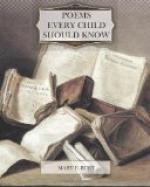“Canst hear,” said one,
“the broken roar?
For methinks we should be
near the shore.”
“Now where we are I cannot
tell,
But I wish I could hear the
Inchcape Bell.”
They hear no sound; the swell
is strong;
Though the wind hath fallen,
they drift along
Till the vessel strikes with
a shivering shock:
“O Christ! it is the Inchcape
Rock!”
Sir Ralph the Rover tore his
hair,
He curst himself in his despair:
The waves rush in on every
side,
The ship is sinking beneath
the tide.
But, even in his dying fear,
One dreadful sound could the
Rover hear,—
A sound as if with the Inchcape
Bell
The Devil below was ringing
his knell.
ROBERT SOUTHEY.
THE FINDING OF THE LYRE.
Once a year my pupils teach me “The Finding of the Lyre.” By the time I have learned it they know the meaning of every line and have caught the spirit of the verse. There is an ancient “lyre,” or violin, made in northern Africa, in the possession of a Boston lady, and I have found the mud-turtle rattle among the Indians on the Indian reservation at Syracuse, New York. They use it as a musical instrument in their Thanksgiving dances. The poem helps to build an interest in history and mythology while it develops a child’s reverence and insight. (1819-91.)
There lay upon the ocean’s
shore
What once a tortoise served
to cover;
A year and more, with rush
and roar,
The surf had rolled it over,
Had played with it, and flung
it by,
As wind and weather might
decide it,
Then tossed it high where
sand-drifts dry
Cheap burial might provide
it.
It rested there to bleach
or tan,
The rains had soaked, the
sun had burned it;
With many a ban the fisherman
Had stumbled o’er and
spurned it;
And there the fisher-girl
would stay,
Conjecturing with her brother
How in their play the poor
estray
Might serve some use or other.
So there it lay, through wet
and dry,
As empty as the last new sonnet,
Till by and by came Mercury,
And, having mused upon it,
“Why, here,” cried he,
“the thing of things
In shape, material, and dimension!
Give it but strings, and,
lo, it sings,
A wonderful invention!”
So said, so done; the chords
he strained,
And, as his fingers o’er
them hovered,
The shell disdained a soul
had gained,
The lyre had been discovered.
O empty world that round us
lies,
Dead shell, of soul and thought
forsaken,
Brought we but eyes like Mercury’s,
In thee what songs should
waken!
JAMES RUSSELL LOWELL.
A CHRYSALIS.
“A Chrysalis” is a favourite poem with John Burroughs, and is found, too, in Stedman’s collection. We all come to a point in life where we need to burst the shell and fly away into the new realm. (1835-98.)




